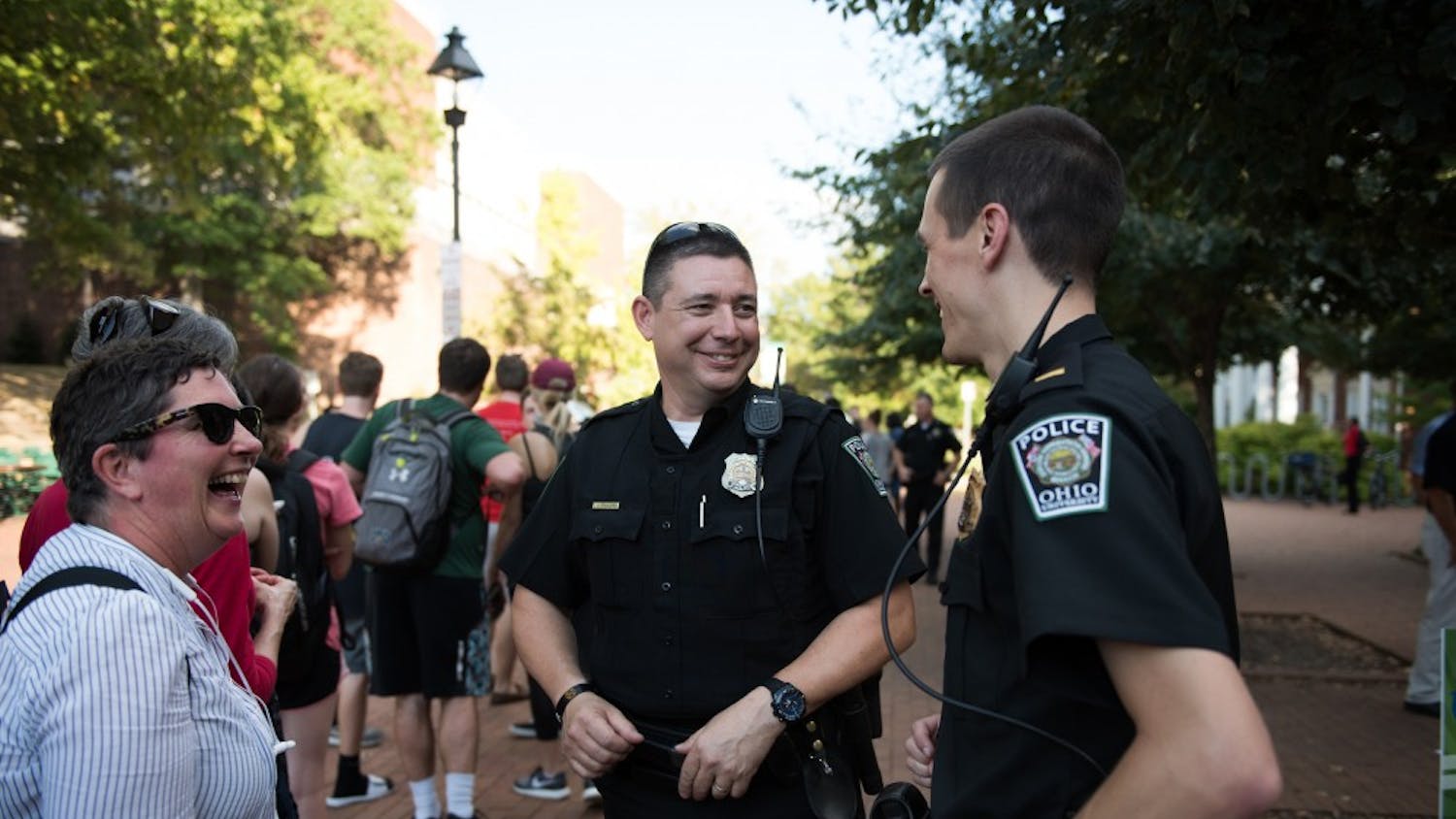The state of Ohio does not have a state police force. Instead, it is made up of 88 sheriffs, one for each of the 88 counties within the state, to compensate for the lack of statewide authorities.
In the rural and underfunded Athens County, the sheriff’s office has proven necessary in assisting police business.
The Athens County Sheriff’s Office has jurisdiction over the entire county, which places about 62,500 people within its purview, according to 2020 Census data.
Athens County Sheriff Rodney Smith, an elected official who has been in his position since March 2014, is the office’s leader.
Before stepping into his current role, Smith worked 27 years as a lieutenant at the sheriff’s office. He retired toward the end of 2013 with plans to become a reserve officer at the Athens Police Department. Instead, he mounted a campaign for sheriff after his predecessor, Sheriff Pat Kelly, was charged with numerous crimes in 2013, including misusing public funds.
Kelly was found guilty of felony corruption charges in 2015, The Columbus Dispatch reported.
“I really had no intention, to be honest, to come back and be a sheriff, which is also a politician. I really didn’t want to do that,” Smith said. “But I had a lot of people keep asking me (to run). … I came back for a lot of reasons, but the main reason is for the safety and well-being of the community.”
The sheriff’s office employs 47 people, including those who work as security officers at the Athens County Courthouse and those who staff the Athens County Dog Shelter. The office’s annual budget of $5 million is funded by the Athens County Board of Commissioners and a small contribution from the state, Smith said.
Smith, who is also the county’s dog warden in his role as sheriff, makes $90,300 annually, almost $20,000 more than the 2022 average national yearly wage for police and sheriffs officers, according to U.S. Bureau of Labor Statistics data.
Though the sheriff’s office is located in the City of Athens at 13 W. Washington St., most of its operations occur well outside city limits in rural or unincorporated areas of the county. The Athens Police Department is well-staffed, Smith said, and has the benefit of working with the Ohio University Police Department, if necessary. Other police departments throughout the county aren’t as lucky.
“The city of Athens (police) are pretty strong, so they pretty much take care of themselves,” Smith said. “We have villages throughout the county, which have their own marshals, but normally they’re very much underfunded. … They are still part of Athens County, we have an obligation to keep those communities safe as well.”
One of those communities is Glouster, a village of about 1,700 people in the northern portion of the county. Chief of the Glouster Police Department, Charles Love, said the department has a mutual aid agreement with the sheriff’s office to ensure it’s able to effectively police the village.
GPD officers are not available 24 hours a day, he said, so the sheriff’s office helps respond when village officers can’t. On April 29, the sheriff’s office assisted Glouster police in a drug bust at a house in the village to recover marijuana, Xanax and cocaine, as well as drug paraphernalia, according to the department’s Facebook page.
“We’re a very small department up here. We only have a couple of paid officers,” Love said. “We rely on the sheriff’s office quite a bit to cover and assist us with any emergencies we have.”
In recent years, the emergence of hard drugs has forced the sheriff’s office to prioritize its drug enforcement efforts. A decade ago, people used plant-based drugs like mushrooms, marijuana and opiates to get high, Smith said. Now, those drugs contain increased levels of chemicals, making them more addictive and more likely to push users to use deadlier substances.
The biggest concern for Smith is the prevalence of illicitly manufactured fentanyl, an opioid that is 50 times stronger than heroin and is used to treat severe pain in clinical settings. Fentanyl and opioids contribute to over 150 overdose deaths per day in the U.S., according to the Centers for Disease Control and Prevention.
“(People) lace fentanyl with an ordinary, lower-quality drug to make it stronger because it’s very cheap and easy to get,” Smith said. “So what happens is they don’t mix it correctly. You overdose and it’ll kill you fast. We literally have people who die with hypodermic needles in their arms.”
To ease some of the county’s overdose deaths, the sheriff’s office recently worked with several groups in Athens during National Drug Take Back Day, a nationwide event aimed at safely collecting and disposing of prescription drugs. One of the groups assisted by the office was the Heritage College of Osteopathic Medicine Anesthesiology Club at OU.
Aric Adams, a second-year medical student at OU who is president of the Anesthesiology Club, helped coordinate the partnership with the office. The two worked with others to establish six drug drop-off locations throughout the county for people to quickly and privately drop off their prescriptions. It’s another way to fight drug addiction and abuse, Adams said.
“Southeast Ohio has been hit really hard, as has the entire United States, by the opioid epidemic. We’re doing a little bit where we can to make the community a little bit safer,” Adams said. “We’re trying to decrease any kind of potential risk associated with (prescription medications).”
It was the first time the club had collaborated with the sheriff’s office to run the event, Adams said, but it went so well that he’s planning to encourage next year’s Anesthesiology Club president to continue the partnership.
Though preventing the creation and distribution of illicit drugs is the office’s main priority, Smith said he’s nearly equally concerned with protecting the health and well-being of Athens residents through community outreach and social programs. Law enforcement is typically associated with arresting criminals, he said, but much more goes into keeping the county safe.
“We have just as big an obligation to protect the innocent as to go after a guilty person,” Smith said. "It’s not always about arresting people, it’s about making a situation better.”






